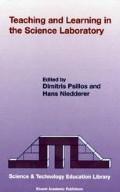Abstract
This work is part of a long-term research programme concerning the design, development, application and evaluation of a laboratory-based teaching learning sequence (TLS) dealing with fluids. We have developed and discuss here an approach to the teaching of the conceptually demanding topic of fluids, which focuses on promoting student teachers’ conceptual and procedural development towards a suggested scientific model and experimental method. In this study we focus on the design aspects of the TLS as well as on selected results concerning students’ conceptual and, mainly, procedural knowledge.
Access this chapter
Tax calculation will be finalised at checkout
Purchases are for personal use only
Preview
Unable to display preview. Download preview PDF.
References
Driver, R., Leach, J., Millar, R. and Scott, P. (1996). Young people’s images of Science, Buckingham: OUP.
Duit, R., (1999). A model of educational reconstruction — A framework for the research and development in Science education. In P. Koumaras, P. Kariotoglou, V. Tselfes & D. Psillos (Eds.), Proceedings of the 1st Panhellenic Conference on science education and Application of New Technologies in education (pp. 30–34). Thessaloniki: Christodoulides (in Greek).
Engel-Clough, E. & Driver, R. (1985). What do children Understand about Pressure in Fluids? Research in Science and Technological Education, 3(2), 133–144.
Gabel, D. L., (1994). Handbook of research on science teaching and learning. MacMillan Pub. Co. N. York.
Germann, P. J. & Aram, R. J., (1996). Student Performances on the Science Processes of Recording Data, Analyzing Data, Drawing Conclusions, and Providing Evidence. Journal of research in science teaching, Vol. 33, No. 7, pp. 773–798.
Howe, C. & Smith, P. (1998). Experimentation and conceptual understanding in school Science. In: Wellington, J. (Ed), Practical work in school Science. Pp. 220–236. Routledge, London and N. York.
Kariotoglou, P. and Psillos, D. (1993). Pupils’ Pressure Models and their implications for Instruction. Research in Science and Technological Education, Vol. 11(1), 95–108.
Kariotoglou, P., Koumaras, P. and Psillos, D. (1993). A constructivist approach for teaching fluid phenomena. Physics Education, 28, 164–169.
Kariotoglou, P., Koumaras, P. and Psillos, D. (1995). Differentiation conceptuelle: un enseignement ď hydrostatique, fonde sur le development et la contradiction des conceptions des eleves. Didaskalia, 7, 63–90.
Kariotoglou, P., Koumaras, P., (1997). Using concept map for comparing pupils conceptions with physics concepts: the case of fluids. Paper presented in the First ESERA Conference, September, Rome, Italy.
Kariotoglou, P. (1998). Investigating aspects of an innovative experimental sequence: The case of fluids. Case Study final report, project Labwork in Science Education, European Commission DGXII, SOE2-CT95-2001.
Leach, J. & Paulsen, A. (Eds.). (1999). Practical work in science education. Roskilde University Press, Frederikseberg & Kluwer Dodrecht.
Linjse, P. L. (1995). “Developmental Research” As a Way to an Empirically Based “Didactical Structure” of Science, Science Education, 79(2), 189–199.
Millar, R. (1998). Rhetoric and Reality. In: Wellington, J. (Ed), Practical work in school Science. Pp. 16–31. Routledge, London and N. York.
Niedderer, H. (1997). Learning process studies in physics: A review of concepts and results. Paper presented in 1997 AERA Annual Meeting, Chicago.
Psillos, D., Kariotoglou, P. (1999). Teaching Fluids: Intended knowledge and students’ actual conceptual evolution. International Journal of Science Education (special issue). Vol. 21, No. 1, pp. 17–38.
Smith, C., Carey, S. & Wiser, M. (1985). On differentiation: A case study of the development of the concepts of size, weight and density. Cognition, 21, 177–237.
Wellington, J. (Ed), (1998). Practical work in school Science. Routledge, London and N. York.
Author information
Authors and Affiliations
Editor information
Editors and Affiliations
Rights and permissions
Copyright information
© 2002 Kluwer Academic Publishers
About this chapter
Cite this chapter
Kariotoglou, P. (2002). A Laboratory-based Teaching Learning Sequence on Fluids: Developing Primary Student Teachers’ Conceptual and Procedural Knowledge. In: Psillos, D., Niedderer, H. (eds) Teaching and Learning in the Science Laboratory. Science & Technology Education Library, vol 16. Springer, Dordrecht. https://doi.org/10.1007/0-306-48196-0_10
Download citation
DOI: https://doi.org/10.1007/0-306-48196-0_10
Publisher Name: Springer, Dordrecht
Print ISBN: 978-1-4020-1018-7
Online ISBN: 978-0-306-48196-3
eBook Packages: Springer Book Archive

